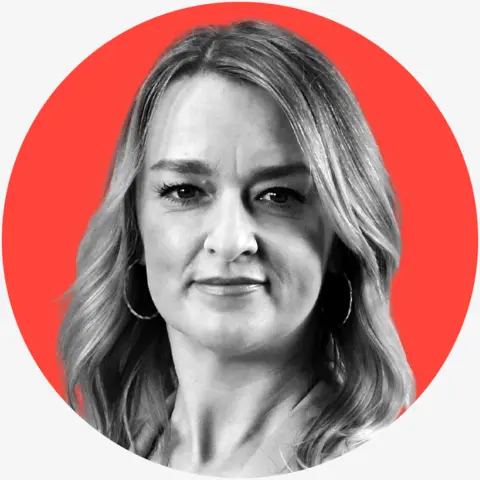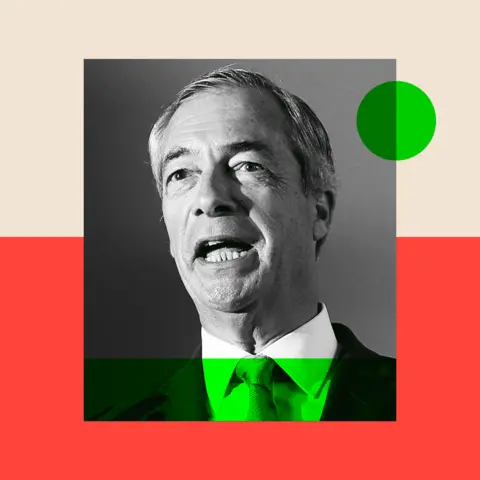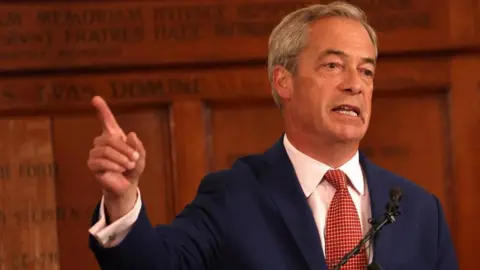ARTICLE AD BOX


8 minutes ago
By Laura Kuenssberg, @bbclaurak,
Sunday with Laura Kuenssberg

 Getty Images
Getty Images
"Farage no more wants responsibility than he wants a vegan cigarette," a long-serving, maybe long-suffering, Brexit campaigner tells me. But the Reform UK leader’s longer-term aim appears to be to smash the Tory Party to bits.
An exasperated senior Conservative says: "It’s all about him, full of anger and problems. Zero solutions."
But why is a man who has failed to get elected to Parliament seven times causing panic in Tory ranks? Why has a small party become the headline grabber?
This week, a much anticipated "crossover moment" arrived – albeit in a single poll, which put Reform UK one percentage point ahead of the Conservatives. Other polls have Rishi Sunak’s party still ahead.
Even if the first poll was right, it does not mean Reform are on course for more MPs than the Tories.
The most optimistic Reform politicians can’t name more than five or six seats where they reckon they could win. In that best-case scenario, they would have fewer than one in 100 MPs – tiny in Westminster terms.
But as polls suggest, Reform could have a big impact by guzzling up many of the Conservatives’ traditional supporters, making it harder for Tory candidates to hang on.
To give a hypothetical example, if Labour is trying to close a gap of 6,000 votes on the Tories, and 3,000 people who voted Tory last time instead opt for Reform, that’s 3,000 fewer votes Labour has to find to win.
Across the country, Reform could win 10%-20% of the vote in hundreds of seats – not enough to win those seats, but the hit to the Tories could be huge, which is why senior Conservatives have begun shouting about the risk.


Sign up for the Off Air with Laura K newsletter to get Laura Kuenssberg's expert insight and insider stories every week, emailed directly to you.


How has this happened?
Privately, Conservatives have been worried about the risk from Reform for many months.
That’s why many of their early campaign offers were designed to appeal to voters who might have been Reform-curious: older, socially conservative, and naturally capital-C Conservatives.
National service, protecting pensions, and the prime minister’s famous promise to “stop the boats”.
Voters planning to back Reform overwhelmingly point to immigration as their main reason, according to research from the polling group, More in Common. Immigration, refugees and Brexit are cited far ahead of admiration for Nigel Farage - or dislike of Sir Keir Starmer or Rishi Sunak.
But one senior Reform figure says they are gaining support because of a much broader feeling of frustration. “Everybody feels a lot poorer. They are terrified of being unwell [because] you can’t see a GP, and people are furious about the levels of legal and illegal immigration.”
In other words, they say, it’s a protest vote, mainly by people who voted Conservative in 2019. But not exclusively - Reform also hope to make a dent in some of Labour’s traditional vote.
Some ministers believe Rishi Sunak has played into Mr Farage’s hands. “Don’t draw attention to things you can’t fix” like illegal migration, one cabinet minister told me.
Others think vowing to “stop the boats” without more radical action, like leaving the European Convention on Human Rights, has made the problem much worse - hot rhetoric, tepid policy.
Guess who and what is back
The real frustration for some Conservatives about what’s happening is that it’s happening again.
Nigel Farage referenced this in an online video, grinning along to Eminem, taunting the Tories with the lyric, “Guess who’s back?”
His party was the most successful in the UK’s European elections under the UKIP label in 2014, spooking David Cameron. He stormed them again with the Brexit Party in 2019, hastening Theresa May’s departure from No 10.
Most memorable of all was his role in pushing for, and then helping to win, the Brexit referendum – even though the official Vote Leave campaign wanted nothing to do with him at the time.
For the Conservatives, dealing with the right is not a new dilemma and the arguments over how to handle it are familiar.
Do you face the political danger and appeal to the right, leaving Reform as little space as possible? Or stick the flag squarely in the middle and not give their arguments any oxygen?
Invite Nigel Farage and his fellow travellers in, occupy that political territory, be “real” Conservatives, one side reckons.
Tory peer Lord Marland said as much on Friday. “I saw him [Farage] at a few Conservative events and he was kind of lifting his trouser leg towards us, and they didn't take the opportunity of binding him into the side."
Others, like Cameron, argue there is simply no space for Mr Farage, and that his “dog whistle” and “inflammatory” language and politics should be completely rejected (Farage has called these comments from Cameron "abusive").
Many Conservatives simply don’t want to be associated with some of the kind of people Reform UK attracts.
All the political parties have had problems with some candidates, recruited in haste when the election was called earlier than most people expected.
But at least 16 Reform candidates are no longer standing because of inappropriate or offensive comments. On Monday, we reported that one had suggested that Britain was wrong to fight Hitler in World War Two.
Some Tory insiders believe the lesson from recent history is that whatever accommodation a Conservative leader has tried to make with the right, whether it’s Mr Farage or some Tory MPs, it’s never enough.
These insiders see it as like a hungry toddler who screams for toast. On receiving toast, they don’t say "thank you so much", they scream for more, then next time toast and jam.

 EPA
EPA
Reform's claim that will become the real opposition in this election will simply not become true without a completely astounding result - but the party's influence could still be dramatic
What next?
Reform sources reckon they are on the verge of something "seismic". Polls suggest they are edging towards a point that could turn a likely Conservative defeat into calamity.
The reality is we don’t yet know what will happen on 4 July, and sometimes sensational claims don’t pan out. It’s up to voters to decide if Mr Farage becomes an MP after many failed attempts, how much damage his party can do, or whether this will prove to be one of those "passing cyclical instances which build his brand", as one source says.
Only last month, Mr Farage was claiming he was off to help get Donald Trump re-elected.
He is clearly enjoying himself - the TikTok videos, the TV interviews, the campaign events, accusing journalists of being "boring, boring" when they ask legitimate questions.
It’s all part of his love of publicity and the airtime which Reform’s position in the polls gives him right now.
Does Mr Farage really want to be an MP? Of course he would say yes. But one source says: "He’s just a reality TV star: going to the jungle wasn’t leaving the political arena, it was coming home," adding he’d be like a "toy dog, like a Yorkie catching his supposed prey" if he won.
Reform might claim they will become the real opposition in this election. With our first-past-the-post voting system, that is simply not going to come true unless something completely astounding happens.
But the party's influence could yet prove dramatic and deadly for the Tories. And whatever happens on 4 July, the Conservatives’ decades-old dilemma – how to deal with the right – will remain.
BBC InDepth is the new home on the website and app for the best analysis and expertise from our top journalists. Under a distinctive new brand, we’ll bring you fresh perspectives that challenge assumptions, and deep reporting on the biggest issues to help you make sense of a complex world. And we’ll be showcasing thought-provoking content from across BBC Sounds and iPlayer too. We’re starting small but thinking big, and we want to know what you think - you can send us your feedback by clicking on the button below.
More on the general election

 7 months ago
25
7 months ago
25








 English (US) ·
English (US) ·